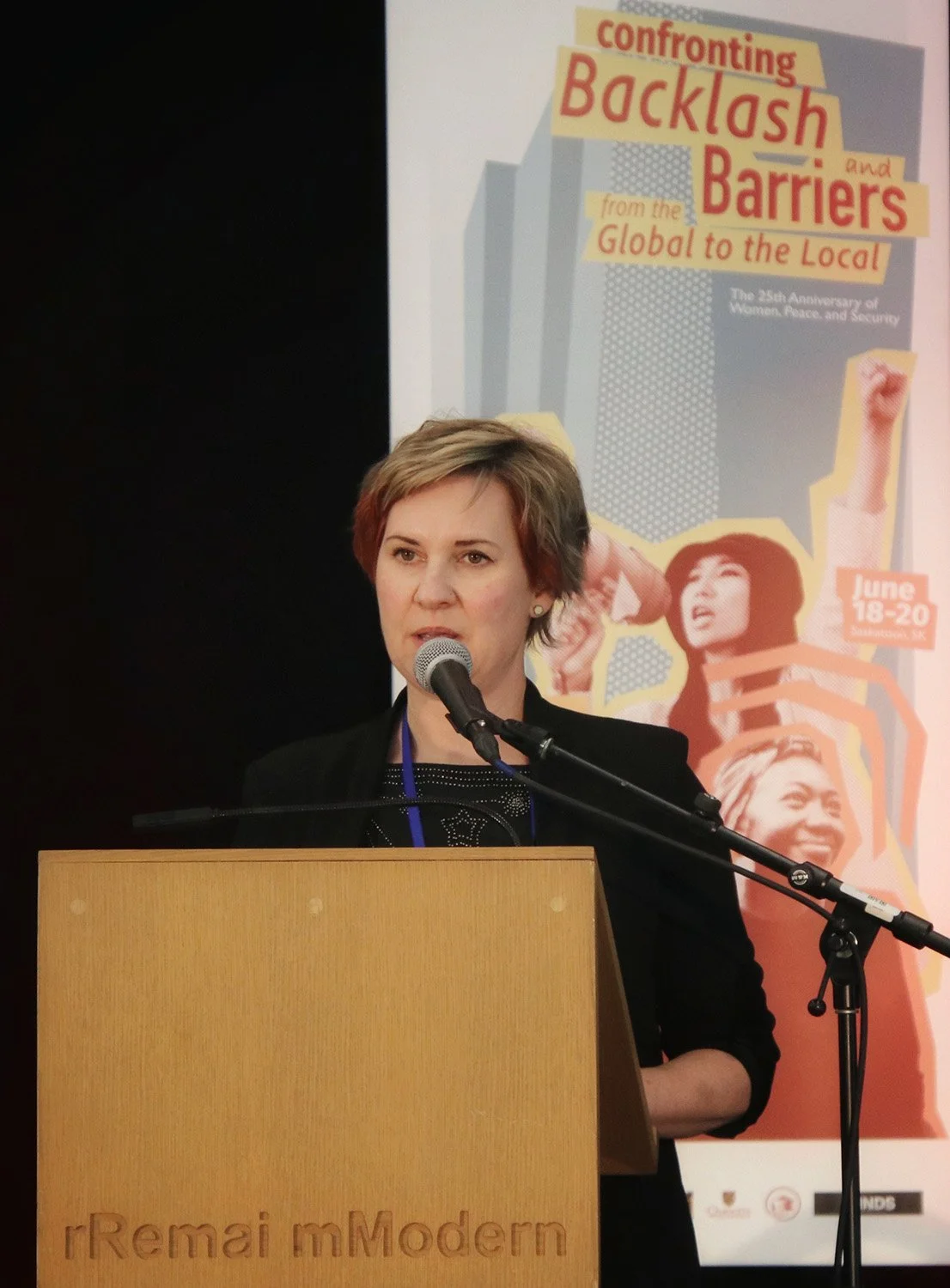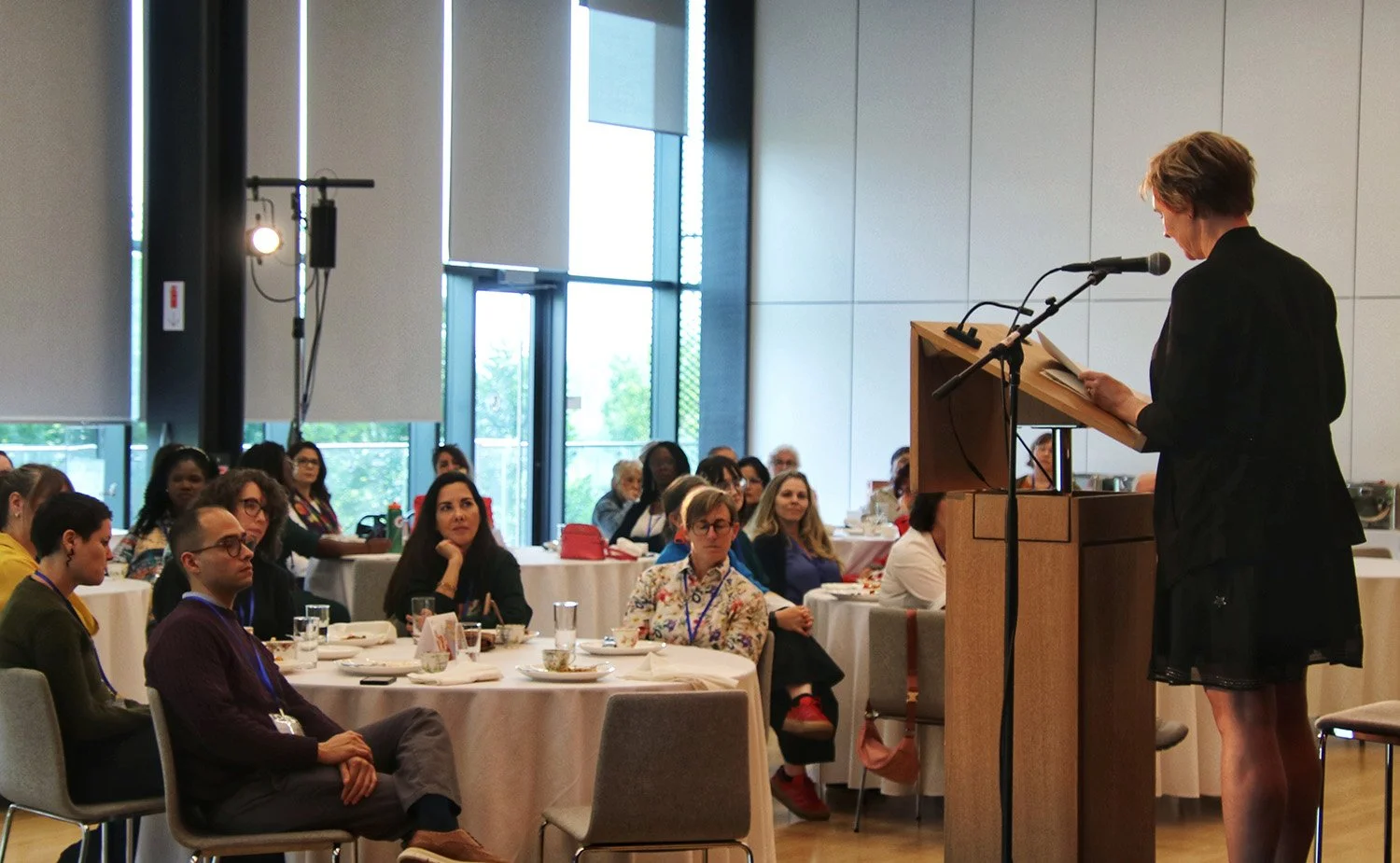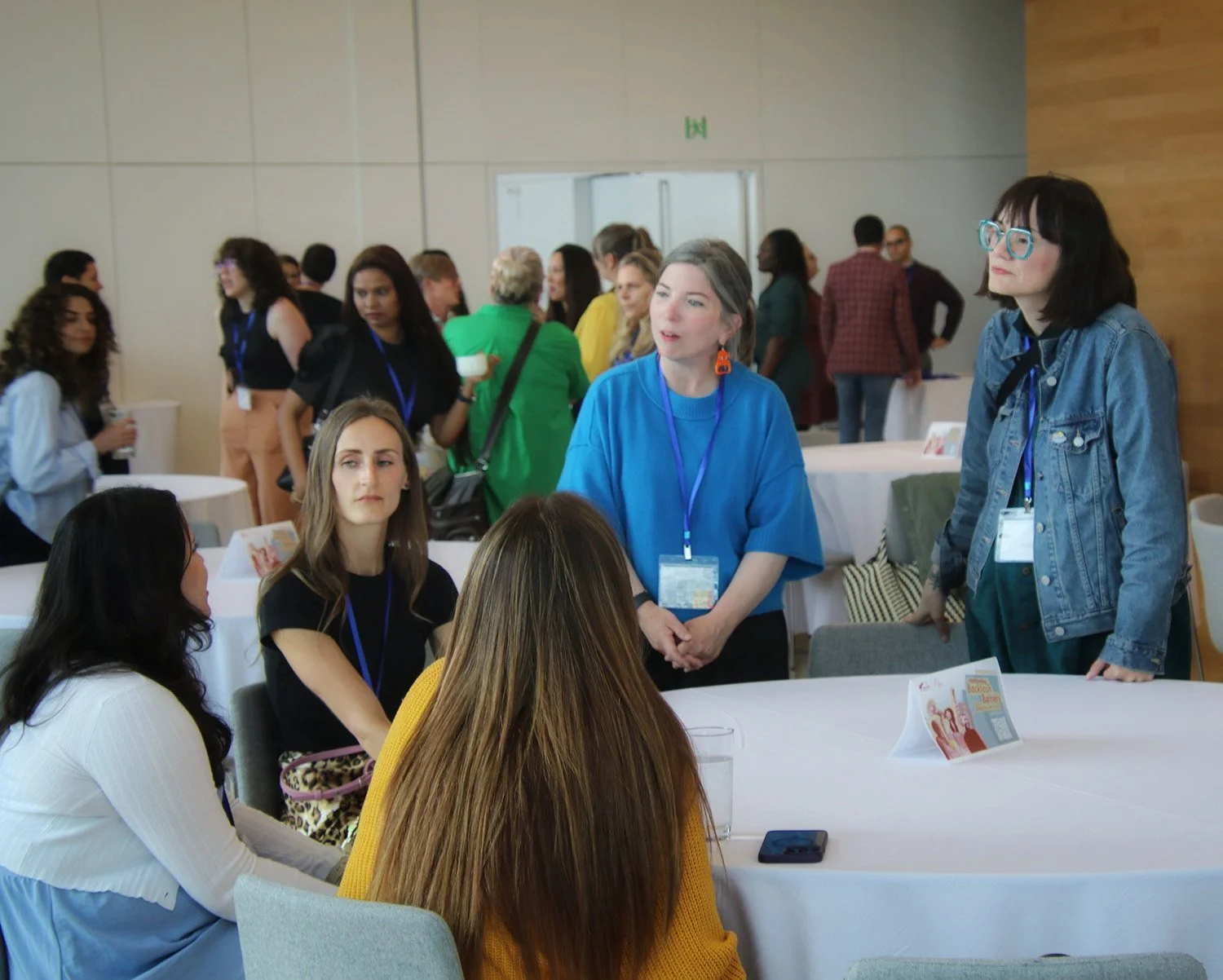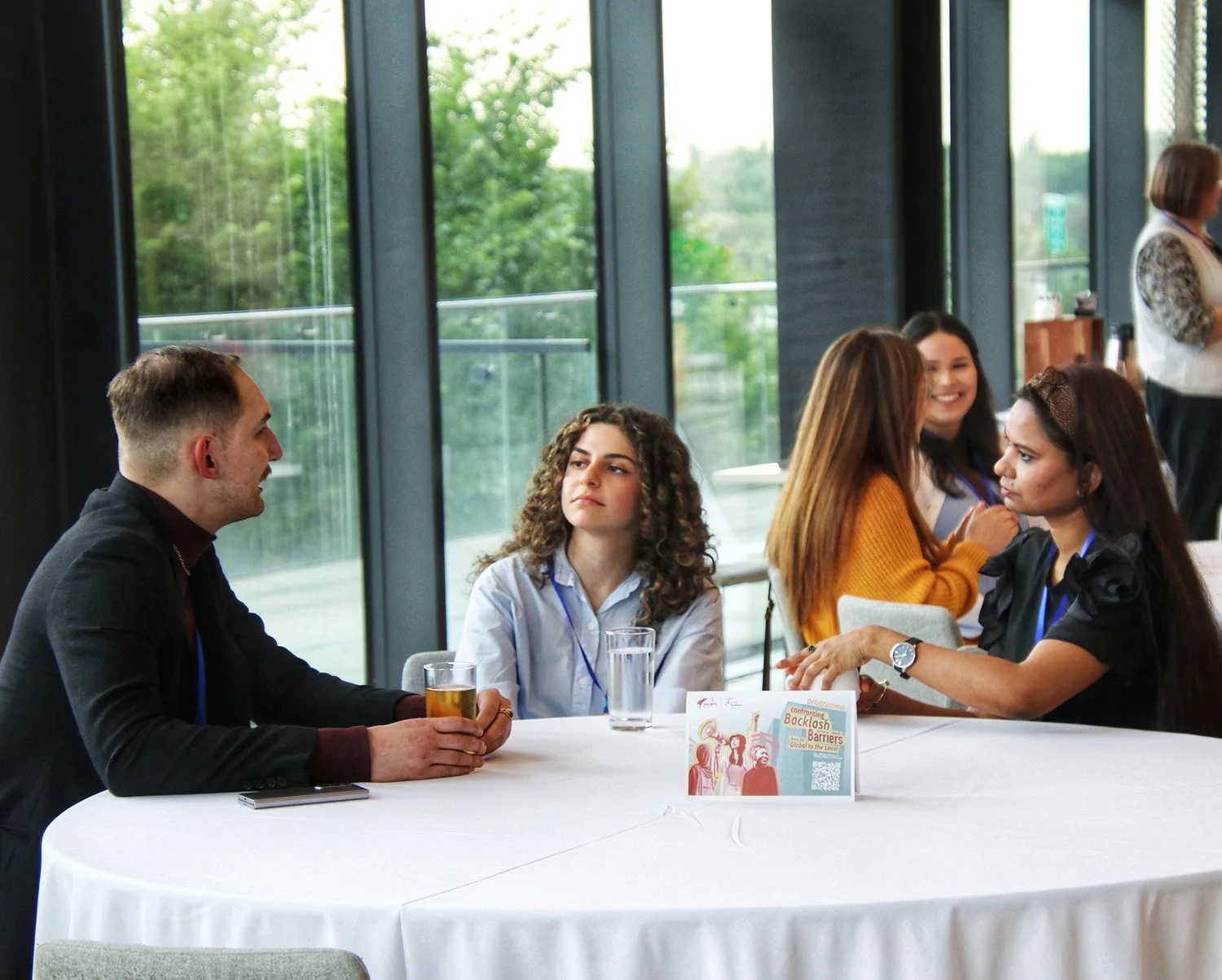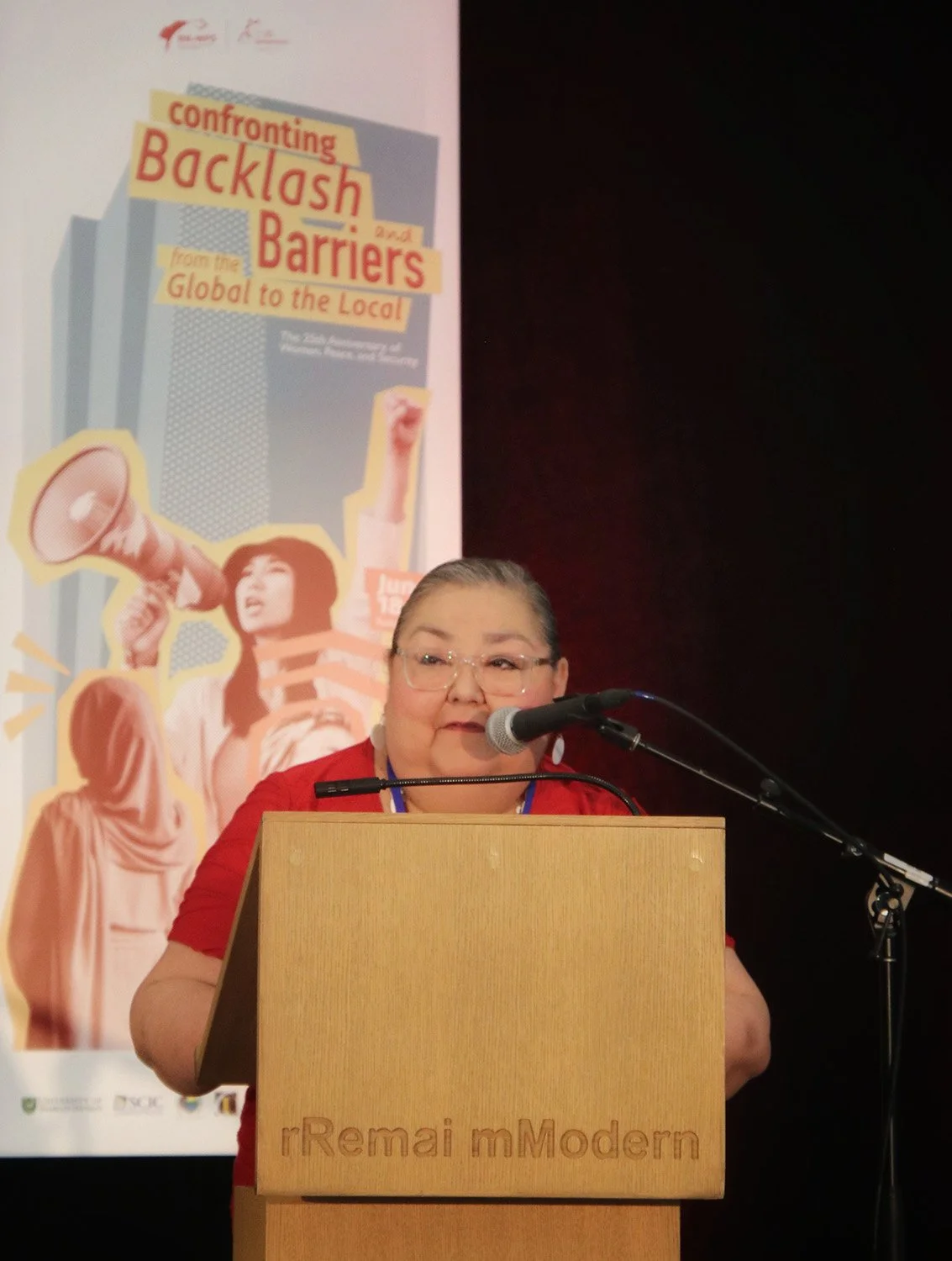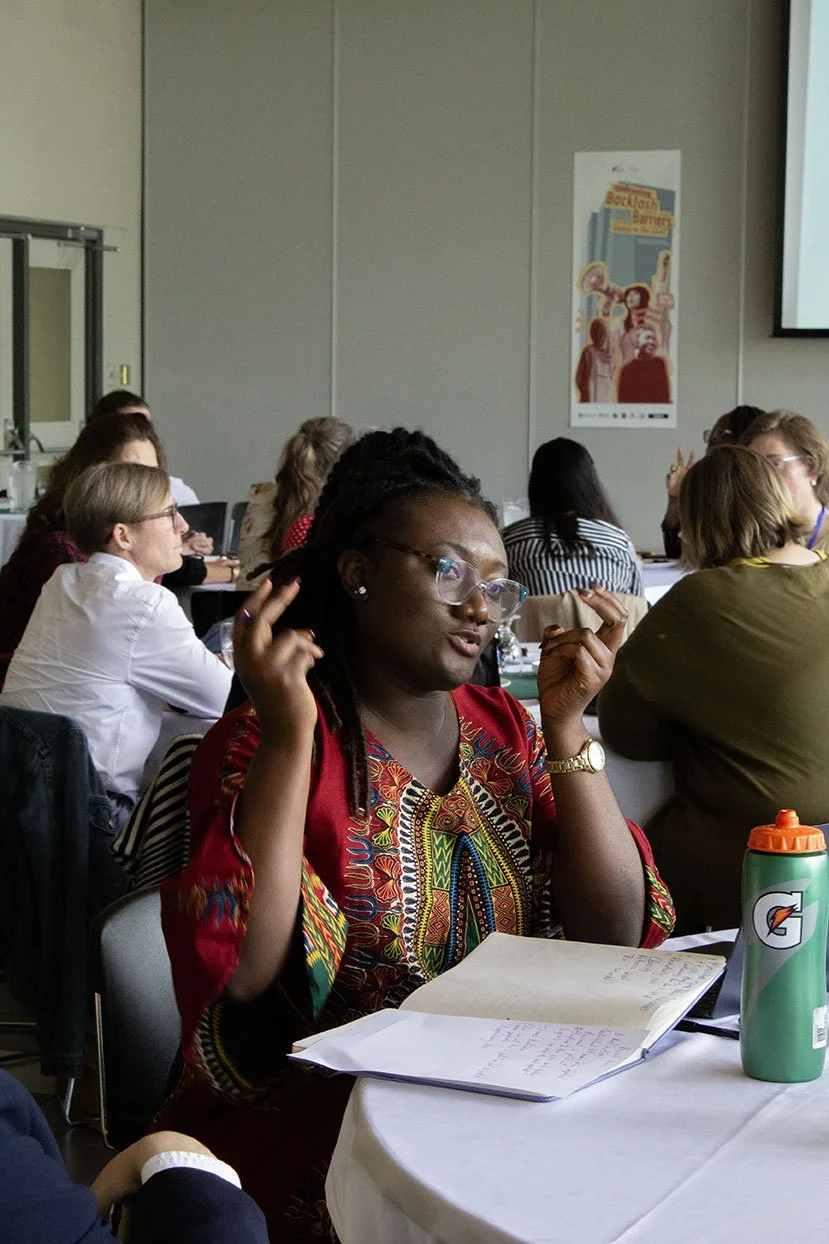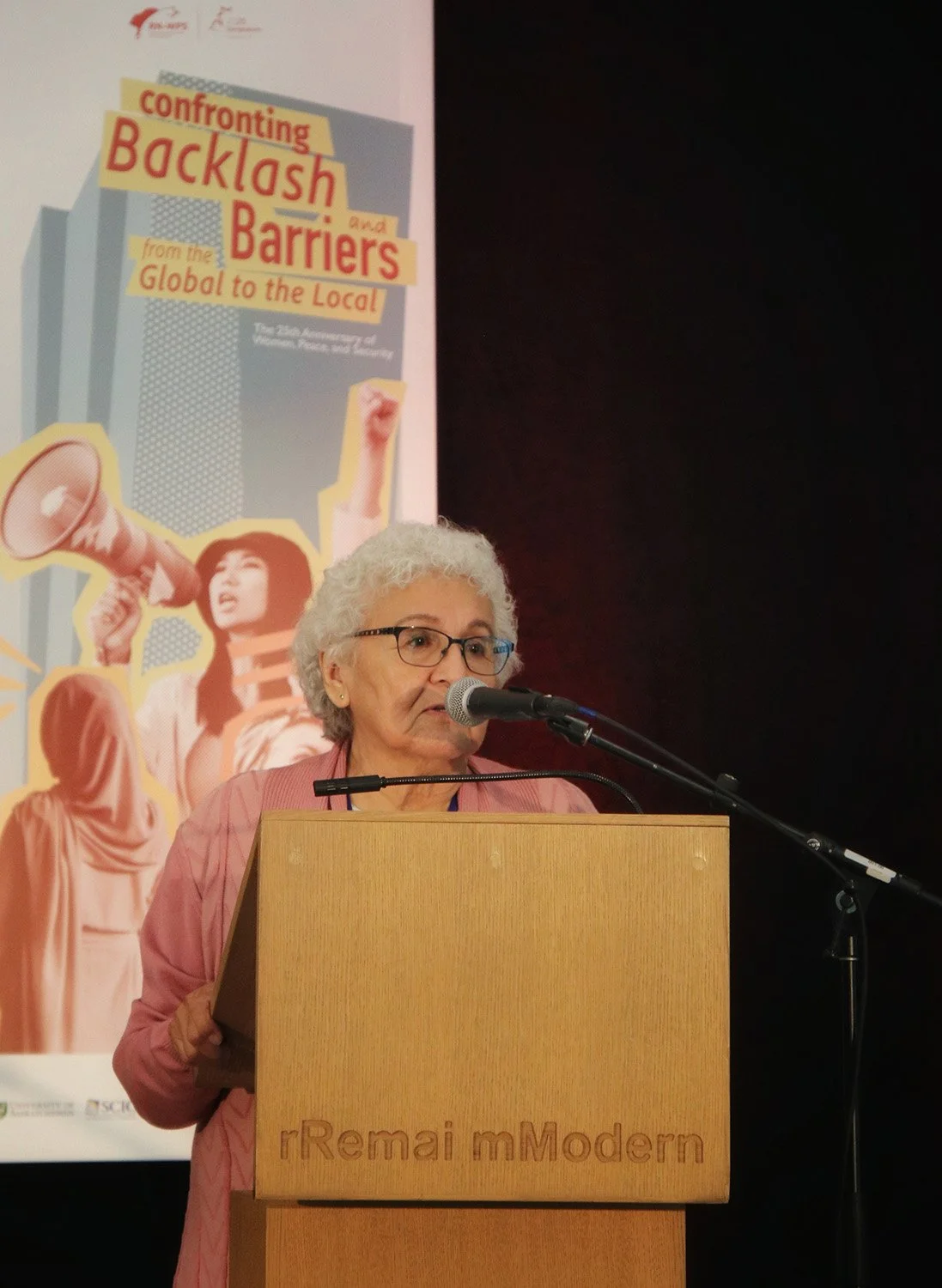
2025 Symposium
Confronting Backlash and Barriers from the Global to the Local:
The 25th Anniversary of Women, Peace, and Security
June 18-20, 2025
The 25th anniversary of the Women, Peace, and Security (WPS) agenda marks both a milestone and a critical juncture. The resurgence of far-right and proto-fascist power holders poses serious threats to the progress achieved under WPS. Recent examples include a resurgence of White supremacist political parties linked to the rollback of reproductive healthcare, and attacks on transgender rights, among many more challenges. The emboldening of climate change denialism and the persistent crisis of gender-based violence, especially against Indigenous women and girls, further signal the far-reaching and multi-sectorial challenges we face. These threats range from climate catastrophes leading to loss of homes and livelihoods to deepening socio-economic inequality, and a violent anti-feminist backlash. Meanwhile, military expenditures are at an all-time high and growing, while wars in central Africa, the Middle East, and Europe rage on. These global issues have immediate consequences for the most vulnerable populations, particularly women, girls, and gender-diverse individuals. To resist the backlash, this conference addresses the urgent need to build on and implement the WPS agenda, at both the local and global levels.
In 2024, Canada released its third national action (2023-2029) plan on WPS, demonstrating more progress in intersectionality and anti-racism than previous plans. Following critiques by WPS activists (Leclerc et. al 2023), it also recognizes that gendered injustices are experienced in Canada, not merely beyond it. Although these aspects of the plan are valuable, questions persist over whether these changes are substantive or rhetorical. For example, Canada’s plan (2024, 9) acknowledges the crisis of violence against Indigenous women, girls, two-spirit and gender-diverse persons as outlined by the National Inquiry into Missing and Murdered Indigenous Women and Girls (2019). Yet, it does not engage with the role of law enforcement or armed forces in past and present gendered colonial violence (Bell and Schreiner 2018; García-Del Moral 2024; Wegner 2023;) or with the report’s recommendations. This omission becomes more concerning considering Amnesty International’s indictment of Canada for its ongoing criminalization of Wet’suwet’un land defenders, including the use of violence, intimidation and harassment against them, leading to a situation in which enduring colonial relations are disguised and depoliticized (Bergman Rosamond et. al 2023). These issues suggest that the WPS agenda can be best realized through sustained policy scrutiny and engagement not only internationally, but also in Canada.
For the first time, the Research Network on Women, Peace and Security is meeting in the Canadian prairies, providing an exciting opportunity to facilitate the inclusion of local agencies working on Indigenous and treaty rights, gender-based violence and discrimination and their vision of international, and settler-Indigenous cooperation. As Saskatchewan leads Canada in violent crime, intimate partner violence, and racialized incarceration rates (Statistics Canada 2023 a, b), there is no better place to convene this knowledge-sharing event on gendered insecurity and colonial violence. The conference will connect local agencies with national and international scholars, spotlighting the importance of local dynamics in the international agenda, and responding to the civil society call to include the domestic agenda in WPS.
-
Bell, Colleen and Kendra Schreiner. 2018. “The International Relations of Police Power in Settler Colonialism: The “civilizing” mission of Canada’s Mounties.” International Journal 73(1), 111-128. https://doi.org/10.1177/0020702018768480.
Bergman Rosamond, Annika, Jessica Cheung, and Georgia De Leeuw. 2023. “Caring Feminist States? Paternalistic Feminist Foreign Policies and the Silencing of Indigenous Justice Claims in Sweden and Canada.” International Feminist Journal of Politics 26(3): 609–32.
Canada. 2024. Foundations for Peace: Canada’s National Action Plan on Women, Peace and Security – 2023 to 2029. Ottawa: Global Affairs Canada
García-Del Moral, Paulina. 2024. “State Complicity: Settler Colonialism, Multisided Violence, and Missing and Murdered Indigenous Women and Girls in Canada.” Social Politics: International Studies in Gender, State & Society, jxae013, https://doi.org/10.1093/sp/jxae013.
Leclerc, Katrina, Bénédicte Santore and Beth Woroniuk (eds.) 2023. Fostering Feminist Peace At Home: Implications for CNAP3. WPSN-C.
National Inquiry into Missing and Murdered Indigenous Women and Girls. 2019. Reclaiming Power and Place: The Final Report of the National Inquiry into Missing and Murdered Indigenous Women and Girls. Volume 1a.
Statistics Canada. 2023a. Chart 3: Police-reported Crime Severity Indexes, by provinces and territory 2019 to 2023. https://www150.statcan.gc.ca/n1/daily-quotidien/240725/cg-b003-eng.htm.
Statistics Canada. 2023b. Over-representation of Indigenous persons in adult provincial custody, 2019/2020 and 2020/2021. https://www150.statcan.gc.ca/n1/daily-quotidien/240725/cg-b003-eng.htm.
Wegner, Nicole. 2023. Martialling Peace: How the Peacekeeper Myth Legitimizes Warfare. University of Edinburgh Press.
Symposium Agenda
-
Riverview Room, Remai Modern
5:30 pm – 6:00 pm: Meet and Greet
6:15 pm: Dinner
6:45 pm - 8:30 pm: Program
Colleen Bell, Welcome and Land Acknowledgement
Georgina Musqua, Smudge and Welcome Blessing
Darlene Okemaysim-Sicotte, Keynote Address: Best Practices by Urban Grassroots: Iskwewuk E-wichitochik (Women Walking Together)
-
Exeter Room, Marquis Hall, University of Saskatchewan
8:30 am – 9:00 am: Breakfast meet and greet
8:55 am – 9:00 am: Welcome from the Research Network on Women, Peace and Security
9:00 am – 10:30 am: Session 1 (Hybrid Panel): Challenges in WPS: New Backlash and Old Barriers
Chair: Yolande Bouka, Queen’s University
Starting with the Everyday: Interrogating Canadian Climate Change and Security Policy, Heather Smith and Gabrielle Daoust, University of Northern British Columbia
Why Cybersecurity Can’t be Ignored in the Women, Peace and Security Agenda? Luna K.C., University of Northern British Columbia.
Cybersecurity and the Women, Peace, and Security Agenda: Perils and Promises, Kate Millar, London School of Economics and Politics
The “s”ubject of Crimmigration Subalterned by the Apparatus of National Security, Venus Torabi, Brock University
Seeing the Violence of Terra Nullius Assumptions in the Canadian Legal System - Robin Hansen, University of Saskatchewan
10:30 am – 10:45 am: Coffee Break
10:45 am – 12:30 pm: Session 2 (Roundtable): Priorities and Lessons on the Crisis of Murdered and Missing Indigenous Women and Girls
Chair: Kathy Walker, Office of the Treaty Commissioner of Saskatchewan
Sheila North, University of Winnipeg
Emma Kytwayhat, RCMP (retired)
Karen Pelletier, RCMP (retired)
Kerry Benjoe, EFN Media and The Eagle
Sheldon Krasowski, Office of the Treaty Commissioner of Saskatchewan
*The Roundtable will conclude with an interactive discussion.
12:30 pm – 1:30 pm: Lunch
1:30 pm – 2:45pm: Session 3 (PechaKucha): A Visual Odyssey by Emerging Scholars: New Directions for WPS
Chair: Rachel Loewen Walker, University of Saskatchewan
Body Politics Unveiled: How the State’s Identity Clash with Women’s Manifests on Their Bodies -Soma Bidarpour, University of Saskatchewan
Transforming Public Spaces: Iran’s Grassroots Movements and the Emancipatory Security Paradigm - Amin Moussavi Nezhad, University of Saskatchewan
It’s About the Principles: Applying a Human Rights-Based Approach to NATO’s Core Task of Crisis Prevention and Management - Brooke Morrison, University of York
Mandating Good Relations: Reconceptualizing Western Family Law for Survivors of Intimate Partner Violence Through Wahkohtowin - Darrelyne Bickel, University of Saskatchewan
Rohingya Women's Transnational Exposure to Multiple Vulnerabilities in Malaysia: Assessing Imposed Precariousness in Domestic and Public Spheres - Tanjila AfrinSejuty, Simon Fraser University
From “The Little Mermaid” to Sea Foam: The Limits of the Copenhagen School and the Evolution of the United Nations’ Women, Peace and Security Agenda (WPS) - Alex Camilo Duran Montano, University of Saskatchewan
Reproductive Justice or the Reproduction of Polarization?: Temporalities for Social Justice and Choice in Debating Morgentaler at the Canadian Museum for Human Rights - Emma Wintermute, University of Saskatchewan
Role of women in conflict resolution: Mitigating negative impacts of mining in Mongolia through international lending institutions, Oyuntuya Shagdarsuren, Alinea International
2:45 pm – 3:00 pm: Coffee Break
3:00 pm – 4:30 pm: Session 4 (Panel): - Global to Local Activism and Advocacy on WPS
Chair: Vanessa Brown, Canadian Forces College
Gender Apartheid in Afghanistan and What it Means for the World - Murwarid Ziayee, Right to Learn Afghanistan
The Intersections of Structural Violence and Opportunities for Solidarity - Ray Acheson, Women’s International League for Peace and Freedom
The Saskatchewan Anti-Violence Research Collaboration Tool (SaVR): Development of a Community-Informed Provincial Research Needs Assessment and Network - Jorden Cummings, Resolve Network and University of Saskatchewan
An Intersectional Analysis of Intimate Partner Violence Against Black Women in Canada - Ketty Anyeko, University of Toronto
-
Cyan Room, Alt Hotel
9:00 am – 9:15 am: Breakfast meet and greet
9:15 am – 10:45 am: Session 5 (Hybrid Panel): The End of DEI? Navigating WPS Through the Backlash
Chair: Ray Acheson, Women’s International League for Peace and Freedom
Essential, not Optional: Gender and Intersectional Mainstreaming in Times of Crisis” - Sara Greco, Department of National Defence
When the Role Vanishes but the Mission Remains: A Gender Advisor’s Journey Through the Backlash - Frieda Garcia, Inter-American Defense College (IADC)
Leading from Within: Backlash as Opportunity to Cultivate Relational Change, - Riel Erickson, Canadian Armed Forces and Global Affairs Canada
10:45 am – 11:00 am: Coffee Break
11:00 am – 12:30 pm: Session 6 (Panel): Feminist Reflections on Intersectionality and the Future of WPS
Chair, Rebecca Tiessen, University of Ottawa
Grassroots Women's Groups as Instigators of Multi-Faceted and Sustainable Peace: An Intersectional Feminist Analysis of the Idle No More Movement" - Susanne Guenther Loewen, Saint Thomas Moore College
Peacemaking in a time of inclusion fatigue - Allison McCulloch, Brandon University
Women, Peace and Security and the United Nations 2030 Sustainable Development Agenda - Siobhan Byrne, University of Alberta
From Kabul to Canada: Advancing Women, Peace and Security through Sport and Social Entrepreneurship - Masooma Sadat, ACSA Cultural and Sports Association
12:30 pm - 1:30 pm: Lunch
END
Deliverables
Equity, Diversity & Inclusion in Action: Canada’s Approach to Women, Peace and Security. Bylines and Frontlines Podcast (Episode 2), Women in International Security Canada and the Canadian Defence and Security Network
https://cdsn.substack.com/p/bylines-and-frontlines-episode-2?r=59taj4
From Tragedy to Accountability: Gender-Based Violence and State Responsibility. Bylines and Frontlines Podcast (Episode 3), Women in International Security Canada and the Canadian Defence and Security Network
https://cdsn.substack.com/p/episode-3-from-tragedy-to-accountability?r=59taj4
Video Presentations
Roundtable : Priorities and Lessons on the Crisis of Murdered and Missing Indigenous Women and Girls
Pecha Kucha Presentation - From “The Little Mermaid” to Sea Foam: The Limits of the Copenhagen School and the Evolution of the United Nations’ Women, Peace and Security Agenda (WPS) -Alex Camilo Duran Montano, University of Saskatchewan
Pecha Kucha Presentation - Role of women in conflict resolution: Mitigating negative impacts of mining in Mongolia through international lending institutions - Oyuntuya Shagdarsuren, Alinea International
Pecha Kucha Presentation - Reproductive Justice or the Reproduction of Polarization?: Temporalities for Social Justice and Choice in Debating Morgentaler at the Canadian Museum for Human Rights - Emma Wintermute, University of Saskatchewan
Transforming Public Spaces: Iran’s Grassroots Movements and the Emancipatory Security Paradigm - Amin Moussavi Nezhad, University of Saskatchewan
Mandating Good Relations: Reconceptualizing Western Family Law for Survivors of Intimate Partner Violence Through Wahkohtowin - Darrelyne Bickel, University of Saskatchewan
Body Politics Unveiled: How the State’s Identity Clash with Women’s Manifests on Their Bodies - Soma Bidarpour, University of Saskatchewan
Event Organizers
Dr. Colleen Bell,
University of Saskatchewan
Soma Bidarpour,
University of Saskatchewan
Partners and Sponsors



